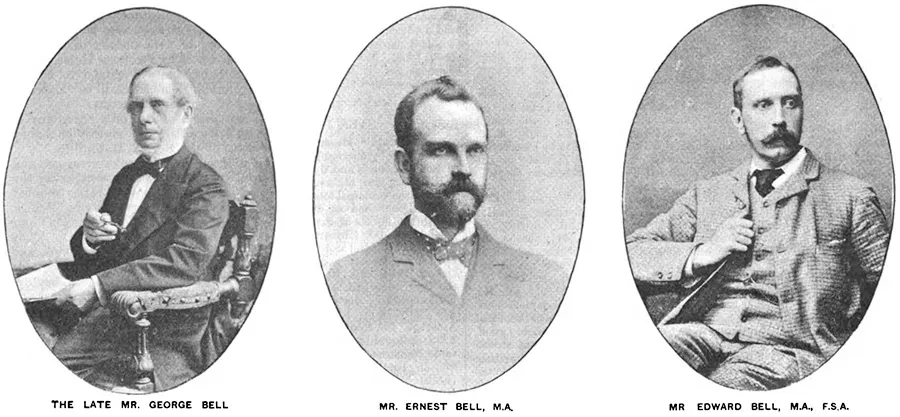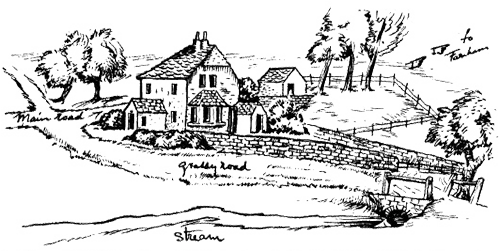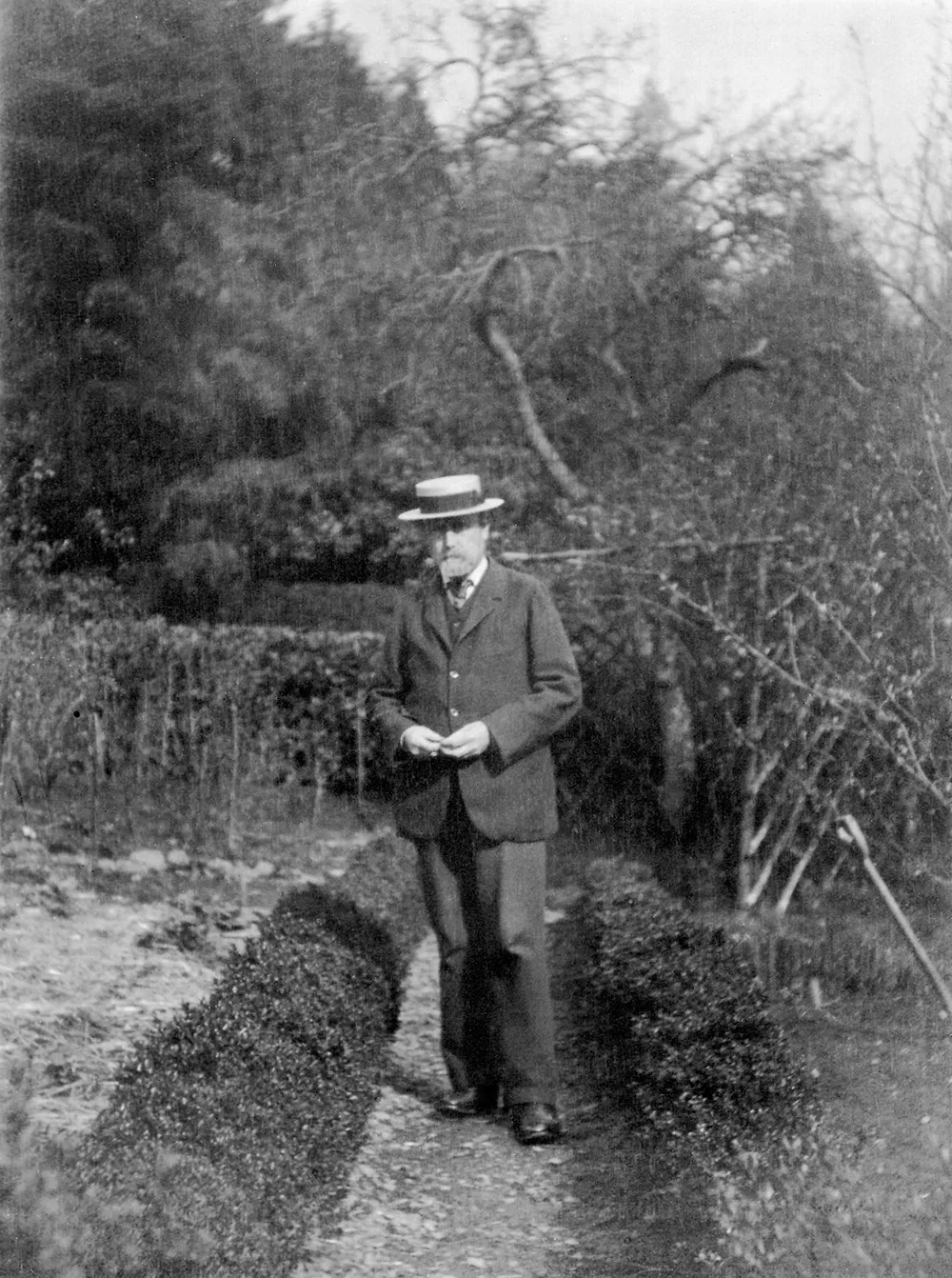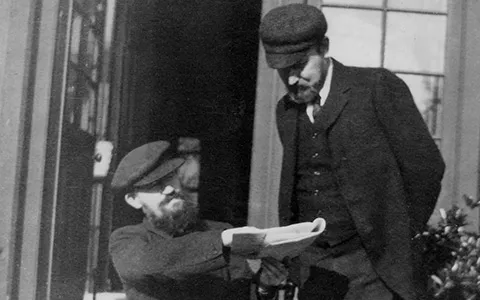Ernest Bell’s father, George, was a well known publisher. The following obituary was published in the The Bookseller, December 13, 1890, pp. 1375-77:
Nov. 27. At his residence, Hampstead Hill Gardens, after a brief illness, aged 76, Mr. George Bell, founder of the well-known publishing house of George Bell and Sons, York Street, Covent Garden.
Deceased was the eldest son of Mr. Bell, of Richmond, Yorks, a provincial bookseller of considerable standing in his day. After leaving school, Mr. Bell assisted his father for a short time, and then came up to London and entered the employ of Whittaker and Co., at that time one of the largest wholesale booksellers in the trade, where, in due course, he rose to the position of head of the counter. Whittaker and Co. had a large school trade, and on leaving that firm, about 1838, Mr. Bell resolved to devote himself chiefly to educational literature.

He commenced business on the first floor of a house in Bouverie Street as a retail school bookseller, keeping a small selection of the best educational books then current. At first he was in partnership with a relative, and the firm traded as Bell and Wood, but the connection was a brief one. Mr. Bell prospered sufficiently that when Williams, of Eton, closed their Eton Warehouse at 186, Fleet Street, Mr. Bell removed thither. The move was a prudent one, as the Eton Warehouse was well-known both to the trade and the public as an educational depot. Mr. Bell now became the agent for several school-book publishers. In addition to keeping a fairly good stock of books published by the Clarendon Press, Parker, of Oxford, and Deightons, Cambridge, Mr. Bell became agent for the smaller publishers, Stevenson, Hall and Grant, of Cambridge, and Abrams, Vincent, and Slatter, of Oxford; and for some years before they had a house of their own, he acted as London agent for Messrs. Macmillan. He published a few small books on his own account; one of his earliest was a work in two volumes on “Warming and Ventilation,” by Walter Bernan. When the Gothic craze set in Mr. Bell threw himself into it, publishing several small archaeological works, and keeping a good supply of al the popular books on Architecture, Heraldry and kindred subjects. Dr. Hook, Vicar of Leeds, afterwards Dean of Chichester, had, while at Leeds, projected a number of small practical religious books, some of which had a large sale. The local publisher, being in difficulties, first pawned and afterwards sold them to Mr. Bell, who thus laid the foundation for a good theological trade, year by year improving his business and enlarging his connection. But his chief stepping-stone was the publication of Notes and Queries. This was projected in 1849 by Mr. Thoms, who had intended to publish this himself in a somewhat amateurish fashion. Fortunately for the success of the venture, Mr. Thoms was induced to change his mind, and acting upon the advice offered, entrusted the periodical to the energetic young publisher in Fleet Street. Notes and Queries turned out a great success, far greater than its projector had anticipated, and it also served as a very useful aid in extending Mr. Bell’s connection as a publisher. Mr. Bell commenced the well-known series of text-books “Bibliotheca Classica” in 1851, in partnership with Whittaker and Co.; but he entire credit of originating the series was due to Mr. Bell, who throughout arranged with the editors, Prof. George Long and Rev. Arthur J. Macleane, and selected the different authors that were to be included in the series.
In 1855 Messrs. J. and J. J. Deighton, of Cambridge, found themselves in difficulties. Their chief assistant was Mr. Wm. Wright Smith, who some time previously had been recommended for the post by Mr. Bell. Mr. Smith, like his father, had been in Whittaker’s employ and left that firm to assist young Mr. John Blackwood, when the latter in 1840 opened a branch office of the ebony firm in Pall Mall. From this it was that Mr. Smith went to Cambridge. An arrangement was now made with Deightons’ creditors, whereby Mr. Bell settled their claims and took over the Cambridge business which thenceforward became Deighton, Bell and Co., with Mr. Smith as manager. Shortly before this Mr. F. R. Daldy gave up the business which, after leaving Rivingtons’, he had started in Paternoster Row, and joined Mr. Bell, and the style of the firm was altered to Bell and Daldy. Mr. Henry George Bohn wishing to dispose of the very large business which he had created, Messrs. Bell and Daldy in 1864 purchased the various libraries which are still identified with Mr. Bohn’s name. It was not, however, until June, 1867, that Messrs. Bell and Daldy moved to York Street, Covent Garden, and for several years afterwards they also retained their Fleet Street premises. Finally their Fleet Street business was disposed of to their assistant in charge, Mr. W. H. Bartlett, who afterwards remove to Salisbury Court. In July, 1873, Mr. Daldy retired, and joined Mr. Howard Spalding and Mr. J. S. Virtue in the formation a a new firm, whilst Mr. Bell admitted two of his sons into partnership, the style of the firm being changed to George Bell and Sons.
In process of years, the business of Whittaker and Co. had suffered a considerable falling off, much of its trade having passed into the hands of younger and more vigorous houses. About ten years ago, the lease of the premises occupied by the firm in Ave Maria Lane having expired, a portion of the business was sold to Messrs. Kent and Co., and a few years afterwards the remaining portion was purchased by George Bell and Sons. Mr. Bell no doubt felt peculiar satisfaction in thus becoming the instrument whereby the name of the time-honoured firm of which he was so distinguished an élève was preserved from extinction. For several years Mr. Bell had taken very little part in the business which had passed under the control of his sons and partners, Mr. Edward Bell and Mr. Ernest Bell. In addition to his reputation as a publisher, Mr. Bell’s sound judgment and long experience led to his services being called into frequent requisition as the confidential friend and adviser in matters of difficulty. In valuations and transfers be was constantly asked to act for one of the parties.
The late Mr. Bell was essentially a likeable man, and probably had more friends in the trade than almost any one of his contemporaries. Cautious, sedate, sparing of his words, there was yet a sympathetic kindliness in his manner which won instant confidence, and led people whom he scarcely knew to appeal to him for helpful counsels in moments of difficulty or trouble. He started in life with no greater advantages than fall to the lot of a son of a fairly prosperous country bookseller, and the position which he finally achieved, of being one of the leading publishers of his time, was due entirely to him. As a young man he was a studious reader, and thus no doubt helped to equip himself for the successful accomplishment of the higher ambitions of his after life. His gentle nature was proof against the insidious vanity which assails most prosperous self-made men. In the end, as at the beginning he was kindly George Bell.


